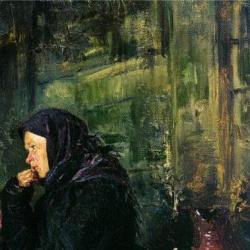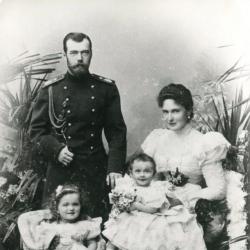Nature in the poems of I. Bunin: analysis of the poem "Motherland". Analysis of the poem Bunin's Motherland What does Motherland mean to Bunin
The lyrics of I. A. Bunin delight with their patriotism. Even in his early poems, the poet expressed an insurmountable sorrow for Russia, about its doom to poverty and suffering.
Bunin put forward such a concept of the fate of the Motherland in his first published lyrical work, “The Village Beggar.” The author, sympathizing with the old man exhausted by poverty, worries about all of Russia. Bunin identifies the bitter fate of the beggar with the fate of the entire country. The homeland is gradually becoming poorer and exhausted, but still fighting. The melancholy and need of Russia weigh heavily on the author. He introduces the image of a beggar not only to emphasize the similarity between the fate of Russia and the fate of its citizen, but also to reveal the reason for the failure of the Motherland: how can a mother be happy and carefree, whose sons, sparing no effort, day after day pray to passersby for alms?
Bunin predicts a sad fate for Russia in the future - the idea of this is hidden in the final lines:
He fell asleep... And then with a groan
For Christ's sake ask and ask...
The suffering of the Motherland will not end - this is not the fault, but the misfortune of the country, therefore the author does not indicate the culprits, does not offer a way to get rid of misfortunes, but only sympathizes with the old man without shelter and a slice of bread and the whole country where such elders exist and, most importantly, where there are people who don't hear their pleas.
Bunin also speaks about the impoverishment and wretchedness of Russia in the poem “Motherland”. The poet expresses boundless love for the Fatherland and sincerely sympathizes with its abandonment. He compares her fate with the fate of an unappreciated mother, whom her own son abhors:
So son, calm and impudent,
Ashamed of his mother -
Tired, timid and sad
Among his city friends...
Russia stands out for its “simplicity, the wretched appearance of its black huts.” But she gives all her property to her “sons” - just like an abandoned mother “saves the last penny for the date.” And he responds with ingratitude. In this comparison, in addition to sympathy, the author’s admiration, respect, and worship are evident. The Motherland gave too much kindness and warmth to each person, too much for its true patriot to forget about it. She is always sweet to him, even in poverty.
Bunin compares the Motherland with the most dear person - the Mother. He draws a parallel between these images and sympathizes with both. He shows the ingratitude and inactivity of the “son”, who:
Looks with a smile of compassion
To the one who walked hundreds of miles...
And the “son” (“son” is a collective image), ashamed of the Motherland in its current state of wretchedness, nevertheless realizes this. He looks at her with a smile of compassion, latently feeling that it is his fault that Russia is fading.
Yes, Russia is fading, but it still lives. And her patriots will always admire her. Love for native nature is reflected in the poem “On the side far from the native land...”. The lyrical hero admires the immense and, unfortunately, inaccessible to contemplation beauty of nature: he lives in a foreign land. He turns his dreams and dreams, his most cherished things, to the Motherland:
I dream of the freedom of quiet villages,
In the field by the road there is a white birch,
Winter and arable land - and an April day.
In dreams, the “exile” sees Russian nature, an abode of warmth and light, full of harmony, beauty, etc. peace. The poet is drawn by the white swell of floating clouds, the blue morning sky, the aerial heights - familiar, and therefore unique; Nowhere can a person see such a majestic beauty of Spring, feel the drift of light air, except in the Motherland. The lyrical hero sees the “Spring Girl”; she is the embodied combination of joy and wisdom, the bearer of the elixir of youth, eternity and infinity - and... she is also devoted to the Motherland:
Her native land is dear to her - the steppe and silence,
The poor north is dear to her, the peaceful labor of the peasants,
And she looks at the fields with greetings:
There is a smile on the lips, and thoughtfulness in the eyes -
The first spring of youth and happiness!
Spring reminds the lyrical hero of his youth spent in his native land and brings him closer to his inaccessible Motherland.
He envies Spring, who is not constrained by anything, and who has the opportunity to enjoy the freedom of her native open spaces. He wants to return and consoles himself with vague hope.
The motif of the Motherland, revealed in the same vein, is also heard in the poem “Far beyond the sea...”. Like the previous one, it contains the experiences of a poet forced to be away from his native land. Fate separated the poet from his Fatherland, doomed him to suffer in a foreign land, where everything is dim and unfamiliar: the sky, waves, sunset. Everything here is melancholy. Everything around him reminds him of his sweet side:
And familiar sadness
The heart aches sweetly:
It seems that again
According to my native steppe
I'm driving down the road...
Bunin is attracted by the simplicity and naturalness of Rus', where the sunset is brighter and everything seems more beautiful. He admires his Motherland and extols its beauty. These feelings were reflected in the poem “Motherland”.
This is a laconic (consisting of eight lines), but capacious lyrical work. Reflecting on the Motherland, the author first of all thinks about an ideal world, alien to vanity, about the eternal component of existence - nature. He admires the vastness and vastness of the expanses of his native country:
Under a sky of dead lead
The winter day is gloomily fading,
And there is no end to the pine forests,
And far from the villages.
The poet sings of this gloominess, and the milky-blue fog similar to gentle sadness, and the dead-leaden veil of a winter day. Despite its exhaustion, gloom and gloom, Russia is beautiful and strong.
And the poem “Overnight” shows the beauty of our native nature, the entire range of its changes. Morning gives way to night, giving the bird-soul the opportunity to return to its homeland. For the soul rejoicing at the imminent merger with the Motherland, everything around is transformed: the sky, previously thickened in darkness, but now shining with purity, a dewy morning. A transformation took place in the soul itself: the night before it meekly froze, grieving, and in the morning it spread its wings. Bunin calls: “Return to your homeland, soul!”, knowing how hard it is to stay away from it.
Bunin also described the feeling of isolation from his native land in the allegorical poem “The Canary”. Longing for her homeland, the canary turned from green to gold. In this there is a hint of a golden cage, of captivity in the “overseas” side, which, although it foreshadows contentment, is still burdensome. Nothing is sweet to a canary - not free, imprisoned in a foreign land. Bunin sympathizes with her, identifying her with his soul:
A free, emerald bird
You won’t, no matter how you sing
About a distant, wonderful island
Above the tavern crowd!
Even worse for Bunin is exile. He talks about this in the poem “Mohammed in Exile.” In separation from the Motherland, even a strong personality is not able to withstand morally. The Prophet was forced to part with everyone he loved. His sadness poured out into “sorrowful words”; he “complained to the rocks.” And although in order to carry out his mission the prophet needed to maintain self-control and not break down before the fate of an exile, he could not overcome his mental pain.
Another poem about an exile is “Prince Vseslav.” Its plot is borrowed from Russian history. “Having sat down in the prince’s place at the wrong time,” Vseslav cowardly fled to Polotsk. The prince was a “dark”, cowardly and cunning man, but in Bunin’s understanding, patriotism redeems all his negative qualities. Vseslav remained faithful to his homeland and yearned for it:
What now, far from the world, in the schema,
Does the dark prince Vseslav remember?
Only your morning bell, Sofia,
Only the voice of Kyiv!
The unforgettable Motherland, according to Vseslav, surpasses Polotsk in everything: both in the beauty of winter landscapes and in the harmony of the city’s panorama. Everything seems to the prince to be painted in gray tones. He dreams of his homeland - he sees it as if in reality:
The prince hears: they call again and are thrilled
Sounds like angelic heights!
In Polotsk they call, but it’s different
He hears in a subtle dream... What years
Sorrows, exile! Unearthly
He remembered it in his heart forever.
Sweet for the “dark” prince are the memories of his native land, where his cowardly, but still noble blood previously raged.
Another facet of the Motherland motif is revealed in the poem “For Treason.” The epigraph to it is a wise saying from the Koran: “Remember those who left their country for the fear of death.” The poem describes the fate of the traitors to the Motherland:
The Lord destroyed them for treason
Unhappy Fatherland,
He littered the fields with the bones of their bodies and skulls.
The traitors were justly punished by God, but the prophet had mercy on them: he begged the Almighty to resurrect them, and he fulfilled the request - he restored their life and forgave their sins. But the traitors did not accept forgiveness from the land, for, according to its laws, such guilt can only be atone for at the cost of one’s own life, given in the name of the Fatherland. Two contradictory legends arose about their further fate, one read: “The resurrected died in battle,” the other objected: they “... lived until their graves in a deserted and wild land.” Bunin despises betrayal; he believes that the crime entailed a well-deserved punishment - to experience torment, being “bowed down in sadness.” Death is a relief for them, and heroic death is an undeserved lot. The homeland deserves to be avenged, both by God, and by the prophet (he softened the punishment sent by the Lord, but by no means abolished it), and by man.
Bunin's philosophical concept of existence is closely intertwined with the theme of the Motherland. This theme permeates the poem “In the forest, in the mountain, a spring, alive and ringing...”. In it, Bunin builds a simple figurative series: an old cabbage roll, a blackened popular print icon, a birch bark. The author claims that he is an opponent of Russian “timid, thousand-year-old slave poverty,” but:
...this cross, but this ladle is white...
Humble, dear features!
A parallel is emerging: “humble features” and the poet’s humility in relation to the wretchedness and poverty of Rus'. He accepts her for who she is - a timid slave, humiliated, crushed and “crumpled,” but who has not lost her living naturalness. Namely, naturalness fascinates the poet.
“In Moscow” is a kind of praise for the native capital. The author admires everything: the thawing snow, the moonlight swaddling the sky, and the drowsy bliss inspired by the night air. The poet accepts everything that belongs to his beloved country and admires nature:
During the day there is a sap, drops of water, the sun warms,
And at night it will freeze, it will become clear,
It’s light - and so similar to Moscow,
Ancient, distant.
There is also nostalgia in the poem: the poet yearns for old Moscow (“old lanes behind the Arbat”, “crosses on an ancient church”). The poem seems torn off, the conclusion is not clearly indicated, but it is easy to guess: Moscow is “... a very special city,” it is gentle and calm at night, bright and sunny during the day. And Moscow is a part of that very Russia, the Motherland that Bunin loved, poor and rich (wealth of nature, history, spiritual strength) at the same time.
Russia, according to Bunin, is an amazing combination of greatness and helplessness. What was laid down long ago, the Motherland has preserved in its entire breadth. However, what people did to her is sad, untenable, meager. This is the country's problem.
In his lyrics, Bunin reflected selfless, devoted love for the Motherland. Seeing the socio-political situation of Russia, he sympathized with it, a country with great opportunities. As a true patriot, he was attracted, and not repelled, by the “wretched huts,” as well as by the greatness of nature, the strength of the country’s spirit, and its rich history. And a living naturalness preserved for centuries.
They mock you
They, O Motherland, reproach
You with your simplicity,
Poor looking black huts...
So son, calm and impudent,
Ashamed of his mother -
Tired, timid and sad
Among his city friends,
Looks with a smile of compassion
To the one who wandered hundreds of miles
And for him, on the date of the date,
She saved her last penny.
____
1891
Analysis of the poem
From the very first lines of the poem, the reader feels the poet’s concern for his homeland, for the house where he was born. In the first quatrain, Bunin makes it clear that his homeland is wretched and too simple at first glance. Reading these lines, I imagined abandoned huts in late autumn from which smoke was pouring out. And although the field work is completed, people are gradually creating comfort at home from what they have. But they don’t have much - simplicity and “black huts”. The poem was written in the poet’s youth; Bunin was then only 21 years old. But already at this age, judging by the poem, Ivan Bunin felt his civic duty and could not remain indifferent to the state of affairs in Russia. It was during these years that famine swept across Russia. Russia, already “poor”, was starving. How can you not mock?
But no matter what this Motherland is, it remains the Motherland forever. Like a mother... And the poet, without sorrow, makes it clear that he is proud of such a mother who saves her last pennies “for the date.” And you, who mock her, continue to mock her. And “be ashamed” if that’s what you want...
Most of the epithets of the poem are painted in dark tones and carry a negative load.. It’s as if the poet lacks a “wretched” appearance and he gives the huts of his Motherland a black color.. Then it’s even “sadder”, the mother, the closest and most beloved person to each of us, appears in a humiliating manner in front of his “impudent” son.. What is this? What does Bunin want to say? Really, personifying the Motherland with his mother, the poet could not find a softer comparison. If you truly experience the words spoken by the poets, you become uneasy. I want to shout: “Where is your soul?! O son! Son of a mother, son of his Motherland.”
The nature of their native country evokes various associations among Russian poets, but its diversity and originality encourage the best lyricists of Russia to again and again turn to the theme of their homeland, native land, and create unique artistic images.
In his short lyric poem “Motherland,” Ivan Alekseevich Bunin creates a picture of a fading winter day. The poet's poetic miniature resembles a pictorial sketch. I.A. Bunin skillfully uses color epithets that help the reader see the picture being depicted: the sky is deathly leaden, the fog is milky blue, the distance is gloomy, the desert is snowy. The depicted artistic images are filled with halftones characteristic of the description of a passing winter day. In the lyrical picture created by the poet, one can guess the Russian open spaces, the immensity of the native landscapes:
And there is no end to the pine forests,
And far from the villages.
In this lyrical work by I.A. Bunin uses various artistic means to make the depicted poetic picture more expressive. For example, the personification “a winter day is gloomily fading” conveys the calm bliss spilled in nature on a winter evening. In the perception of the lyrical hero, fog is associated with gentle sadness:
One fog is milky blue,
Like someone’s gentle sadness...
This comparison creates a sad mood. The poet is simultaneously intoxicated by the picture that has opened, and sad about the passing day. The poem sets the reader up not only for hidden contemplation of nature and intoxication with artistic images, but also for various thoughts: about the meaning of life, the irrevocably passing of time.
Thus, thanks to a small poetic work by I.A. Bunin's "Motherland" gives the reader the opportunity to look into his soul, into his inner world.
(Option 2)
Literary works are often compared to works of painting. The impression conveyed by the poet may be like a painting. So, in the poem by I.A. Bunin's "Motherland" the sky above the poet's head is "deadly leaden", heavy, oppressive, gray, somehow hopeless. Evening is approaching, but this approach begins quite early in winter. Perhaps it is precisely this prematurity that makes the day go away “sullenly”, and not even go away, but fade, gradually, reluctantly giving up its positions.
Most likely, the poet is either on the road or on a country estate: the only thing he sees is the forests that either run in front of him, or he knows that between his house and neighboring villages and cities there are vast Russian forests. There is “no end to the forests,” and the villages are “far away.” How simply said, but how much is conveyed.
Russia is huge, it is not limited to cities and towns. First of all, these are Russian villages and vast expanses of forests, fields and roads. A picture of rural Rus', Russian open spaces, unfolds before us. And not only does the space described in the poem expand wider, but also upward: pine trees, dark, tall, stand like a wall before our mental gaze, as in Russian folk tales they stood between the heroes and their pursuers.
One fog is milky blue,
Like someone's gentle sadness,
Above this snowy desert
Softens the gloomy distance.
The forest does not give the feeling of a desert at all, but the monotony of the landscape can be comparable to it. The grayness of the landscape: dark sky, white snow, black silhouettes of pine trees is softened by a white-blue fog, which the poet compares with someone’s gentle sadness. It feels like someone is carefully wrapping the earth with a warm, stuffy, soft blanket. The fog is not even white-blue, but milky-blue, reminiscent of fabulous milk rivers flowing in the jelly banks of a dream, a dream.
The picture described in the poem is gloomy, gloomy, dim, but with its halftones it gives us the opportunity to color it in our own way, in accordance with our imagination, with our winter impressions. My homeland here is forests, sky, fog, distance... a fairy tale.
(Illustration: Sona Adalyan)
Analysis of the poem "Motherland"
The nature of our homeland is capable of evoking a wide variety of emotions and impressions in Russian writers and poets; its diversity and originality have never left them indifferent, pushing them to create unique artistic images that touch us all by the soul and awaken deep, reverent feelings for the place where we were born and grew up to his homeland.
In two small quatrains, written by Bunin back in 1896, before he left Russian soil forever in 1920, the Russia that he took in his heart forever far to a foreign land is clearly described, clearly and without any embellishment: old and gloomy, not yet stained by the blood of the fratricidal civil war, dull and devoid of joy, but so real and original, not without its certain charm, dear and therefore still loved and dear.
The poem begins with a dull and gloomy picture of one winter day going to sunset. Bunin very accurately, with the help of color epithets, conveys the mood of this day, helping readers imagine a sky of deathly lead color, “blue-milky” fog, a desert of snow and the distance hidden in the dusk. Before us appears a dull and gloomy picture of a winter day in Rus', with its endless and vast expanses that stretch endlessly and wherever you look, “there is no end to the pine forests and far from the villages.”
If the first part of the work involuntarily evokes melancholy and despondency, when everything around is gloomy and depressing, the psyche is pressed by the feeling of a “deadly leaden sky”, the absence of people and signs of life, then the second quatrain is no longer filled with such a depressive mood and artistic descriptions of nature become softer and even “humane”. For example, this can be felt in the comparison of the milky blue fog with someone’s gentle sadness, which “softens the ghostly distance.” In this comparison, the poet unites nature with the spirit of Russian people, making them united in their gentle sadness. In general, humility has always been inherent in the Russian peasantry; the sadness that Bunin noticed during his trips through the Russian outback in the eyes of children and adults was, in his opinion, a harbinger of those terrible historical events that befell the Russian peasantry in the future. Nature and Russian people in this poem become one, because just as fog “softens the gloomy distance,” so bright sadness makes a person’s face softer and defenseless, washes away despondency and hopelessness, adding features of spirituality and sublime feelings. After reading Bunin’s poem, you experience a storm of opposite feelings, first despondency and even depression, and then enlightenment and bright sadness. For Bunin, his homeland was and remained a country of contradictions, in which the broken ruts of dirty roads coexisted with the mesmerizing beauty of the landscapes around, ignorance and poverty with the beauty of the Russian soul. And although his feelings for her were very controversial and contradictory, he always kept her in his heart, even in a distant foreign land.
It’s not easy to talk about the works of I. A. Bunin, because in comparison with him you feel completely tongue-tied. At the age of 21, an aspiring poet, who had no personally pressing, deep themes, writes an amazing poem. His analysis - Bunin, "Motherland" - is the topic of this article.
Five years later, the poet will create a striking and recognizably accurate landscape, which he will call “Motherland” (1896). We will also pay attention to the analysis of this work.
The ridicule of stupid children
In “Motherland”, in just 12 lines, the poet does not reveal to us either his potential, or his clearly expressed individuality, or his stunning, well-crafted verse. He has not yet gained experience, although he has already been publishing since he was 17 years old. In the spirit of the times, he tries to reflect social evil. His homeland is simple, wretched and black. They mock her. Who? Her children. If you think about it and analyze it (Bunin, “Motherland”), this motive is not new. There is no freshness in it; one feels secondary and repeats the motives of democratically minded poets, writers and artists.
Beggar peasant woman
This is how the country appears in all lines. This is how you see it, as in the paintings of the Wanderers or in the unforgettable poem by A. Blok “To sin shamelessly...”, written much later.

She is timid, downtrodden, in a heavy coat tied with a rope, in a checkered warm scarf, ashamed of herself - this is Russia, if we analyze it. Bunin shows his mother his calm and impudent, well-fed son, whose cheeks are shiny and his belly is protruding. He is ashamed of her in front of his all-satisfied city friends, who have picked up the heights of culture, but there is no depth in them. The analysis is sad. Bunin does not add externally decorative features to the Motherland. He uses here the technique of allegory and open mockery of her so-called children, unworthy of her spiritual beauty and power.
The finale - what does the motherland get?
A smile of compassion - after all, she walked (she did not travel, since she is a beggar) hundreds of miles to see her little blood, saving up to give him her last penny.

And the date itself, apparently, will pass quickly and briefly: her son doesn’t need her like that. This is what semantic analysis says. Bunin sympathizes with his motherland, but what can he do if all around him is stupid savagery and thirst for profit. This, of course, is not an epigram, but there is a satirical portrait here.
The author's main idea
The children of this homeland need it in splendor and grandeur, but in shabby form they do not need it. We continue our analysis of the verse “To the Motherland”. Bunin, using personification, showing a simple Russian woman in the image of the Motherland, tries to reveal her unattainable spiritual superiority over children who have become rich and are eager for even more money. Who are these children? Former peasants who have turned into small and greedy shopkeepers who have nothing sacred. The poem is written in classical iambic. Here Bunin ("Motherland") collides the rural and provincial wilderness with the city. Analysis of the poem speaks only of the complete hopelessness and hopelessness of the situation. About the dead end.
Five years later
Now we see another Bunin, who lyrically revealed the beauty of his country. This is the poem "Motherland". It is even shorter, but much more significant.

Analysis of Ivan Bunin's poem "Motherland"
“Motherland” is a miniature sketch of a winter evening. The eight-line poem, written in iambic, has only two verbs. The winter day fades gloomily and for a long time. The landscape is bleak. The sky is deathly leaden. Everywhere you look there are endless pine forests, and the villages are far away. The second part visibly complements the first. It seems that the landscape is painted on canvas. It is as expressive as the nature is calm and deserted. The gloomy snowy distance and snow-covered desert are covered and sadly softened not even by white, but by milky blue fog. I. Bunin is extremely precise in his definitions, and therefore a picture of an immense country emerges (there is no end in sight to the pine forests, the villages are unknown where). On a winter evening, the landscape is filled with unclear halftones. The homeland appears before the reader in all its sad and meek glory. We are used to her like this, often dim and inconspicuous, but touching the soul to the quick, sometimes fabulously beautiful in all its manifestations, even in such sad, hopeless and sorrowful ones. The poet showed his beloved rural Motherland, gloomy, twilight, dim, framed by pine forests, the end and edge of which is not visible.






